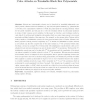Free Online Productivity Tools
i2Speak
i2Symbol
i2OCR
iTex2Img
iWeb2Print
iWeb2Shot
i2Type
iPdf2Split
iPdf2Merge
i2Bopomofo
i2Arabic
i2Style
i2Image
i2PDF
iLatex2Rtf
Sci2ools
119
click to vote
EUROCRYPT
2009
Springer
2009
Springer
Cube Attacks on Tweakable Black Box Polynomials
Almost any cryptographic scheme can be described by tweakable polynomials over GF(2), which contain both secret variables (e.g., key bits) and public variables (e.g., plaintext bits or IV bits). The cryptanalyst is allowed to tweak the polynomials by choosing arbitrary values for the public variables, and his goal is to solve the resultant system of polynomial equations in terms of their common secret variables. In this paper we develop a new technique (called a cube attack) for solving such tweakable polynomials, which is a major improvement over several previously published attacks of the same type. For example, on the stream cipher Trivium with a reduced number of initialization rounds, the best previous attack (due to Fischer, Khazaei, and Meier) requires a barely practical complexity of 255 to attack 672 initialization rounds, whereas a cube attack can find the complete key of the same variant in 219 bit operations (which take less than a second on a single PC). Trivium with 735 i...
| Added | 24 Nov 2009 |
| Updated | 24 Nov 2009 |
| Type | Conference |
| Year | 2009 |
| Where | EUROCRYPT |
| Authors | Itai Dinur, Adi Shamir |
Comments (0)

